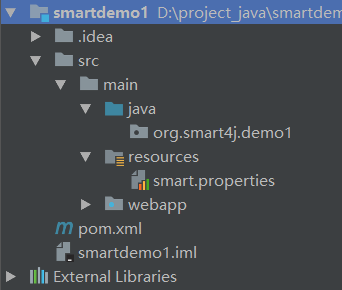上一篇我们搭建了项目环境【从零写javaweb框架】(一)搭建开发环境,接下来要做的是定义和加载框架的配置项
第一步:定义配置项
打开上一篇创建好的demo1示例项目,在src/main/resources目录下创建一个smart.properties文件,内容如下:
#MySQL驱动 smart.framework.jdbc.driver=com.mysql.jdbc.Driver #数据库url,不同数据库的url格式会有所不同,详情请百度 smart.framework.jdbc.url=jdbc:mysql://localhost:3306/demo #数据库的账户名与密码 smart.framework.jdbc.username=root smart.framework.jdbc.password=root #demo1项目的基础包名 smart.framework.app.base_package=org.smart4j.demo1 #JSP的基础路径 smart.framework.app.jsp_path=/WEB-INF/view/ #静态资源文件的基础路径(如js、css、图片等) smart.framework.app.asset_path=/asset/
第二步:加载配置项
现在已经有配置文件了,我们在这一步要做的是读取配置文件,首先写一个读取配置文件的工具类PropsUtil(注意:从这一步开始要切换到框架项目上进行):
package org.smart4j.framework.util;
import org.slf4j.Logger;
import org.slf4j.LoggerFactory;
import java.io.FileNotFoundException;
import java.io.IOException;
import java.io.InputStream;
import java.util.Properties;
/**
* desc : 属性文件工具类
* Created by Lon on 2018/1/21.
*/
public final class PropsUtil {
private static final Logger LOGGER = LoggerFactory.getLogger(PropsUtil.class);
/**
* 加载属性文件
*/
public static Properties loadProps(String fileName){
Properties props = null;
InputStream is = null;
try {
is = Thread.currentThread().getContextClassLoader().getResourceAsStream(fileName);
if (is == null){
throw new FileNotFoundException(fileName + "file is not found");
}
props = new Properties();
props.load(is);
} catch (IOException e){
LOGGER.error("load properties file failure", e);
} finally {
if (is != null){
try {
is.close();
} catch (IOException e){
LOGGER.error("close input stream failure", e);
}
}
}
return props;
}
/**
* 获取字符型属性(默认值为空字符串)
*/
public static String getString(Properties props, String key){
return getString(props, key, "");
}
/**
* 获取字符型属性(可指定默认值)
*/
public static String getString(Properties props, String key, String defaultValue){
String value = defaultValue;
if (props.containsKey(key)){
value = props.getProperty(key);
}
return value;
}
/**
* 获取数值型属性(默认为0)
*/
public static int getInt(Properties props, String key){
return getInt(props, key, 0);
}
/**
* 获取数值型属性(可指定默认值)
*/
public static int getInt(Properties props, String key, int defaultValue){
int value = defaultValue;
if (props.containsKey(key)){
value = CastUtil.castInt(props.getProperty(key));
}
return value;
}
/**
* 获取布尔型属性(默认为false)
*/
public static boolean getBoolean(Properties props, String key){
return getBoolean(props, key, false);
}
/**
* 获取布尔型属性(可指定默认值)
*/
public static boolean getBoolean(Properties props, String key, boolean defaultValue){
boolean value = defaultValue;
if (props.containsKey(key)){
value = CastUtil.castBoolean(props.getProperty(key));
}
return value;
}
}
可以看到PropsUtil依赖了CastUtil这个工具类,这个类也需要我们来写,它的主要功能是类型转换:
package org.smart4j.framework.util;
/**
* desc : 类型转换工具
* Created by Lon on 2018/1/21.
*/
public final class CastUtil {
/**
* 转为String
*/
public static String castString(Object obj){
return CastUtil.castString(obj, "");
}
/**
* 转为String(提供默认值)
*/
public static String castString(Object obj, String defaultValue){
return obj != null ? String.valueOf(obj) : defaultValue;
}
/**
* 转为double
*/
public static double castDouble(Object obj){
return castDouble(obj, 0);
}
/**
* 转为double(提供默认值)
*/
public static double castDouble(Object obj, double defaultValue){
double value = defaultValue;
if (obj != null){
String strValue = castString(obj);
if (StringUtil.isNotEmpty(strValue)){
try {
value = Double.parseDouble(strValue);
} catch (NumberFormatException e){
value = defaultValue;
}
}
}
return value;
}
/**
* 转为long
*/
public static long castLong(Object obj){
return castLong(obj, 0);
}
/**
* 转为long(提供默认值)
*/
public static long castLong(Object obj, long defaultValue){
long value = defaultValue;
if (obj != null){
String strValue = castString(obj);
if (StringUtil.isNotEmpty(strValue)){
try {
value = Long.parseLong(strValue);
} catch (NumberFormatException e){
value = defaultValue;
}
}
}
return value;
}
/**
* 转为int
*/
public static int castInt(Object obj){
return castInt(obj, 0);
}
/**
* 转为int(提供默认值)
*/
public static int castInt(Object obj, int defaultValue){
int value = defaultValue;
if (obj != null){
String strValue = castString(obj);
if (StringUtil.isNotEmpty(strValue)){
try {
value = Integer.parseInt(strValue);
} catch (NumberFormatException e){
value = defaultValue;
}
}
}
return value;
}
/**
* 转为boolean(提供默认值)
*/
public static boolean castBoolean(Object obj){
return castBoolean(obj, false);
}
/**
* 转为boolean(提供默认值)
*/
public static boolean castBoolean(Object obj, boolean defaultValue){
boolean value = defaultValue;
if (obj != null){
value = Boolean.parseBoolean(castString(obj));
}
return value;
}
}
CastUtil里面又用到了StringUtil,它是我们对commons-lang3中的StringUtils进一步封装:
package org.smart4j.framework.util;
import org.apache.commons.lang3.StringUtils;
/**
* desc : 字符串工具
* Created by Lon on 2018/1/21.
*/
public class StringUtil {
/**
* 判断字符串是否为空,这里会先去除字符串两端的空格再作判断
*/
public static boolean isEmpty(String str){
if (str != null){
str = str.trim();
}
return StringUtils.isEmpty(str);
}
/**
* 判断字符串是否为非空
*/
public static boolean isNotEmpty(String str){
return !isEmpty(str);
}
}
顺便我们再把 commons-collections4的集合工具类也进一步封装(以后会用到的):
package org.smart4j.framework.util;
import org.apache.commons.collections4.CollectionUtils;
import org.apache.commons.collections4.MapUtils;
import java.util.Collection;
import java.util.Map;
/**
* desc : 集合工具类
* Created by Lon on 2018/1/21.
*/
public final class CollectionUtil {
/**
* 判断Collection是否为空
*/
public static boolean isEmpty(Collection<?> collection){
return CollectionUtils.isEmpty(collection);
}
/**
* 判断Collection是否非空
*/
public static boolean isNotEmpty(Collection<?> collection){
return !isEmpty(collection);
}
/**
* 判断Map是否为空
*/
public static boolean isEmpty(Map<?, ?> map){
return MapUtils.isEmpty(map);
}
/**
* 判断Map是否非空
*/
public static boolean isNotEmpty(Map<?, ?> map){
return !MapUtils.isEmpty(map);
}
}
到此,我们一口气写了4个工具类,这些类以后还会经常用到。
然后我们再次步入正题:如何读取smart.properties文件中的配置呢,现在需要先写一个ConfigConstant类来维护配置文件中各项配置的名称:
package org.smart4j.framework;
/**
* desc : 框架配置常量
* Created by Lon on 2018/1/21.
*/
public interface ConfigConstant {
//对应配置文件名称
String CONFIG_FILE = "smart.properties";
//对应数据库连接配置项
String JDBC_DRIVER = "smart.framework.jdbc.driver";
String JDBC_URL = "smart.framework.jdbc.url";
String JDBC_USERNAME = "smart.framework.jdbc.username";
String JDBC_PASSWORD = "smart.framework.jdbc.password";
//分别对应项目基础包名、JSP路径、静态资源基础路径
String APP_BASE_PACKAGE = "smart.framework.app.base_package";
String APP_JSP_PATH = "smart.framework.app.jsp_path";
String APP_ASSET_PATH = "smart.framework.app.asset_path";
}
最后一步就是借助刚才写的PropsUtil工具类来实现ConfigHelper,其实就是通过定义一些静态方法让它有能力获取smart.properties中的配置项:
package org.smart4j.framework.helper;
import org.smart4j.framework.ConfigConstant;
import org.smart4j.framework.util.PropsUtil;
import java.util.Properties;
/**
* desc : 属性文件助手类
* Created by Lon on 2018/1/21.
*/
public final class ConfigHelper {
private static final Properties CONFIG_PROPS = PropsUtil.loadProps(ConfigConstant.CONFIG_FILE);
/**
* 获取JDBC驱动
*/
public static String getJdbcDriver(){
return PropsUtil.getString(CONFIG_PROPS, ConfigConstant.JDBC_DRIVER);
}
/**
* 获取JDBC URL
*/
public static String getJdbcUrl(){
return PropsUtil.getString(CONFIG_PROPS, ConfigConstant.JDBC_URL);
}
/**
* 获取JDBC用户名
*/
public static String getJdbcUsername(){
return PropsUtil.getString(CONFIG_PROPS, ConfigConstant.JDBC_USERNAME);
}
/**
* 获取JDBC密码
*/
public static String getJdbcPassword(){
return PropsUtil.getString(CONFIG_PROPS, ConfigConstant.JDBC_PASSWORD);
}
/**
* 获取应用的JSP路径
*/
public static String getAppJspPath(){
return PropsUtil.getString(CONFIG_PROPS,ConfigConstant.APP_JSP_PATH, "/WEB-INF/view/");
}
/**
* 获取应用的静态资源路径
*/
public static String getAppAssetPath(){
return PropsUtil.getString(CONFIG_PROPS, ConfigConstant.APP_ASSET_PATH, "/asset/");
}
}
可以看到 ConfigHelper的最后两个方法设置了它们的默认值,也就是说,如果在配置文件中没有特别指明该配置项的值,那么就会用到它们的默认值。至此,配置方面先讲到这里,毕竟这章已经写得很长了...哈哈,最后附上完成这章内容后的框架项目(图一)和实例项目demo1(图二)的完整目录图,这样就会比较清晰了:
图一:
总结:
这一章写了4个常用工具类,1个维护常量的类,并且通过依赖它们用ConfigHelper实现了配置文件的读取,下一篇将会写一个类加载器,用来加载基础包名下的所有类(类似于Spring的扫包功能,如扫一个包下含有某个注解的全部类)。
